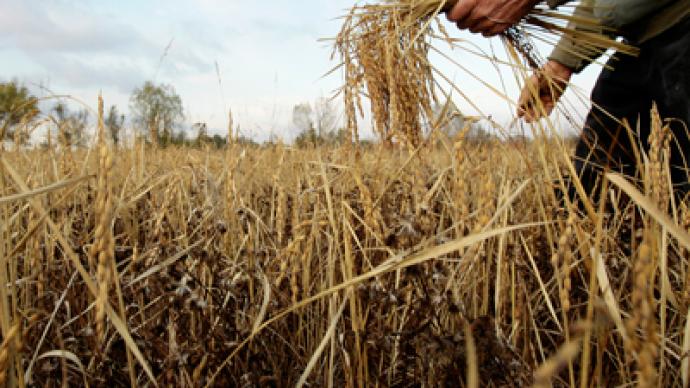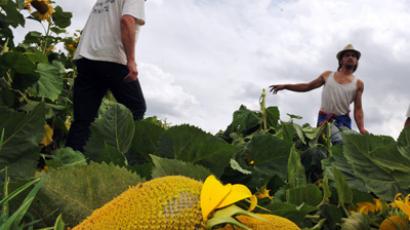Monsanto takes home $23mln from small farmers, seeks to maintain 'seed oligarchy'

Seed giant Monsanto has won more than $23 million from hundreds of small farmers accused of replanting the company’s genetically engineered seeds. Now, another case is looming – and it could set a landmark precedent for the future of seed ownership.
The lawsuits concern Monsanto’s patent rights as the company strives to prevent farmers from replanting crops grown from the company’s seeds. It’s a concept that a study published on Tuesday – titled 'Seed Giants vs. US Farmers' – referred to as creating a “seed oligarchy.”In the report, the Center for Food Safety (CFS) said it discovered 142 patent infringement suits against 410 farmers and 56 small businesses in more than 27 states as of December 2012. The amount of money pocketed by Monsanto comes to a whopping $23 million. The study was co-produced by the Save our Seeds (SOS) campaign.Another case is now on the horizon, and it’s drawing wide public attention: The verdict of the trial will determine who controls the rights to seeds planted in the ground. It will also determine whether patent owners of other products which can make copies of themselves – such as stem cells and strains of bacteria used for medical research – and can continue to control the use of their products after selling them. It’s a scenario that wasn’t even considered until recently.“We’re dealing with laws and doctrines that were developed in the 19th century, where the idea of self-replicating technologies didn’t exist,” Jorge Contreras, associate law professor at American University in Washington told Bloomberg Businessweek.It’s been dubbed a 'David and Goliath' trial by many, as multi-billion-dollar Monsanto goes head to head against 75-year-old Indiana farmer Vernon Hugh Bowman, who said that fighting for justice is his main concern. “I really don’t consider it as David and Goliath,” Bowman told the Guardian. “I don’t think of it in those terms. I think of it in terms of right and wrong.”At the center of the case is Monsanto’s protection of its patented soybean, known as Roundup Ready. When farmers like Bowman plant the company’s seeds, they are only allowed to harvest the resulting crop – not keep any for next year’s harvest.Under these rules, farmers have to buy new Monsanto seeds to plant each season, even if they already have usable seeds in their possession. However, farmers are able to buy excess soybeans from local grain elevators, many of which are likely to be Roundup Ready seeds. One of Bowman's trips to such a grain elevator put him in Monsanto’s sights.“We have always had the right to go to an elevator, buy some ‘junk grain’ and use it for seed if you desire,” Bowman explained.But the question of whether he really does have that right is still up in the air. and will be determined by a Supreme Court judge.
Monsanto has claimed it maintains patent rights on its genetically modified seeds, even if sold by a third party such as a grain elevator. The company also said this protection extends for generations down, which means it owns seeds that are 'descendants' of original Monsanto seeds. The company wasted no time suing Bowman, eventually winning a legal settlement of around $84,456 in 2011. Unwilling to back down, Bowman took the case to the Supreme Court. Though trials are expensive, it was Bowman’s lack of cash that prompted him to take the case to America’s highest court, ironically.When Monsanto originally sued Bowman, he was already bankrupt as a result of land deal gone wrong, so he had very little to lose. “I made up my mind to fight it until I could not fight it anymore,” he said. “I thought, I am not going to play dead.”The Supreme Court trial is scheduled for February 19. The farmer has received an impressive outcry of support, including CFS and the Save our Seeds campaigning group.
Hindering the ‘breakthroughs of tomorrow?’
Monsanto has set up a website defending its arguments. The company insists a victory by Bowman in the Supreme Court could “jeopardize some of the most innovative biotechnology research in the country” in industries ranging from farming to medicine. “Without such protections, anyone could create a virtually limitless supply of patented technology, eviscerating the incentive to continue the R&D investments that will bring about the breakthroughs of tomorrow,” David Snively, general counsel for Monsanto, said in a statement.A victory for Bowman “would potentially kill the seed industry,” Peter Corless of Edwards Wildman Palmer LLP in Boston, which specializes in biotechnology patents, told Bloomberg Businessweek. “No one would bother doing the research. If you sold just one round of seeds, you’d never be able to price high enough to recoup the costs of development and marketing.”But Bowman’s lawyer said that issues regarding research aren’t his client’s problem. “The reality is, he’s not a free-rider,” Attorney Mark Walters told Bloomberg Businessweek. “He paid fair value for these seeds and like any owner of personal property he should be able to use it for any purpose he chooses. It’s not competitive with first-generation seed that Monsanto sells.”














